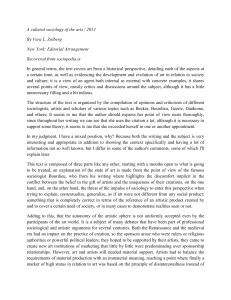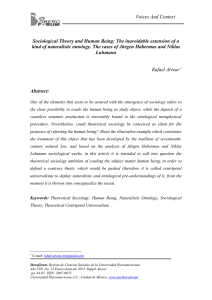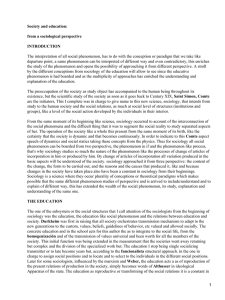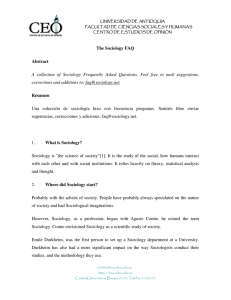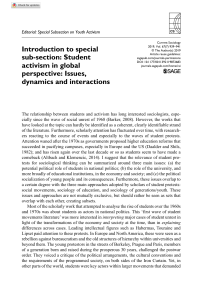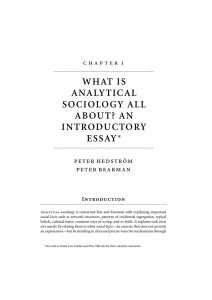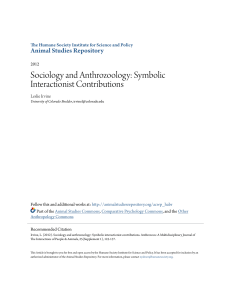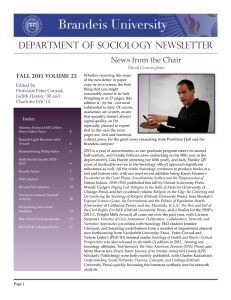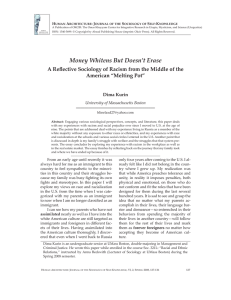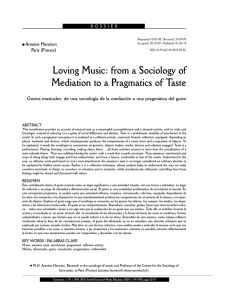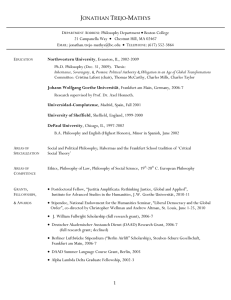English for Social Sciences
Anuncio
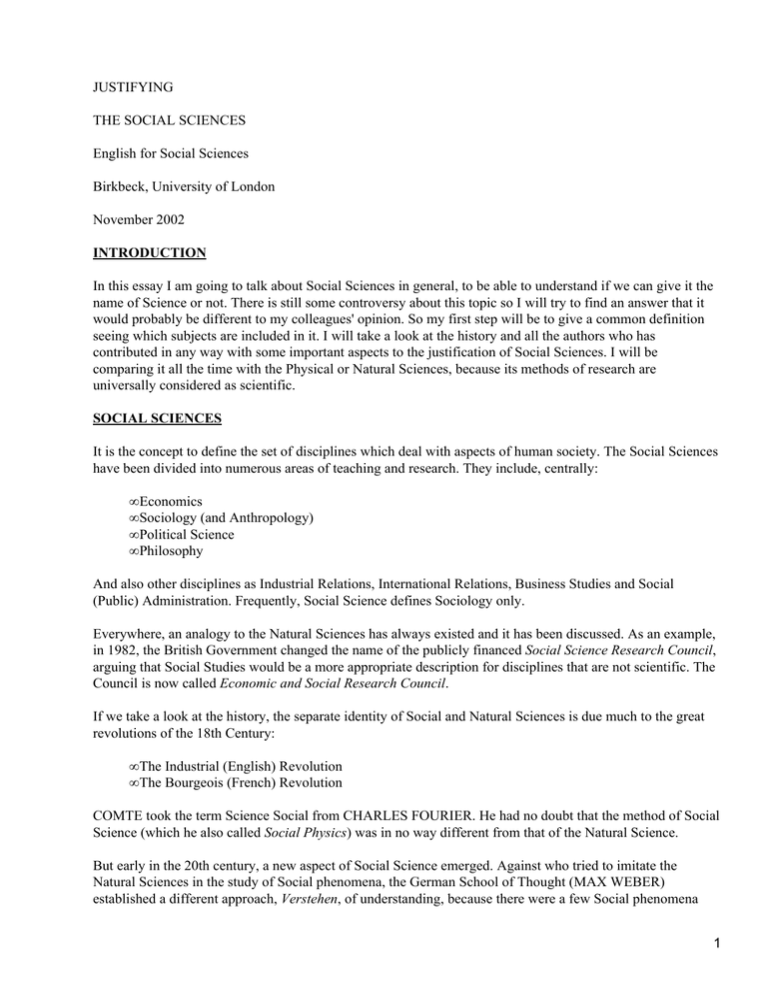
JUSTIFYING THE SOCIAL SCIENCES English for Social Sciences Birkbeck, University of London November 2002 INTRODUCTION In this essay I am going to talk about Social Sciences in general, to be able to understand if we can give it the name of Science or not. There is still some controversy about this topic so I will try to find an answer that it would probably be different to my colleagues' opinion. So my first step will be to give a common definition seeing which subjects are included in it. I will take a look at the history and all the authors who has contributed in any way with some important aspects to the justification of Social Sciences. I will be comparing it all the time with the Physical or Natural Sciences, because its methods of research are universally considered as scientific. SOCIAL SCIENCES It is the concept to define the set of disciplines which deal with aspects of human society. The Social Sciences have been divided into numerous areas of teaching and research. They include, centrally: • Economics • Sociology (and Anthropology) • Political Science • Philosophy And also other disciplines as Industrial Relations, International Relations, Business Studies and Social (Public) Administration. Frequently, Social Science defines Sociology only. Everywhere, an analogy to the Natural Sciences has always existed and it has been discussed. As an example, in 1982, the British Government changed the name of the publicly financed Social Science Research Council, arguing that Social Studies would be a more appropriate description for disciplines that are not scientific. The Council is now called Economic and Social Research Council. If we take a look at the history, the separate identity of Social and Natural Sciences is due much to the great revolutions of the 18th Century: • The Industrial (English) Revolution • The Bourgeois (French) Revolution COMTE took the term Science Social from CHARLES FOURIER. He had no doubt that the method of Social Science (which he also called Social Physics) was in no way different from that of the Natural Science. But early in the 20th century, a new aspect of Social Science emerged. Against who tried to imitate the Natural Sciences in the study of Social phenomena, the German School of Thought (MAX WEBER) established a different approach, Verstehen, of understanding, because there were a few Social phenomena 1 that could not be studied with such rigid scientific analysis. VERSTEHEN: One of the significant aspects of this theory is that it poses the problem of intercultural access to meaning and the understanding of an Other's viewpoint. How does one escape from the particularity of one's own understanding as a researcher and 'comprehend' the understanding of another person, group or historical culture? Verstehen has been parodied as a matter of "putting oneself in someone else's shoes" to see social situations from 'their' point of view. MAX WEBER introduced as well into Social Sciences what were later called Hermeneutics. HERMENEUTICS: To interpret or translate". It is the theory and practice of interpretation. The "hermeneutic cycle" is the process by which we return to a text, or to the world, and derive a new interpretation. These two expressions are very important inside Social Sciences, but are most closely associated with the subject of Sociology and its history. I think it explains the way that Social Scientists do their research, trying to understand all the points of view and making different interpretations in order to be able to affirm that an hypothesis is true or not. Economics it began to go its own way. It has developed as the discipline which most deserve the name of Science (among all the other Social Sciences). As an Economics student I can say that theories are developed and tested, if not always against reality, then at least, against models and their hypothesis. Descriptive economics have become the exception. However, Humanistic Geography, Philosophy, Sociology, Political Science, Psychology and History, have in common their anti−scientific postures. They concentrate on people rather than external forces. Imply an emphasis on emotions and morality rather than instrumental calculation, interpretive rather than quantitative methods. The difference between Social and Natural Sciences is the individual. The Sociologists, in general, have different views: • There are some of them who do not share the idea of Social studies should be seen as scientific in any case based on the Physical Sciences. • For some Sociologists, the essential characteristics of social action mean that Sociology can only explain satisfactorily using significative understanding and explanation and that scientific laws can play no part. • And the most Sociologists recognize that important differences exist between the Social and the Physical Sciences, but they reject any suggestion that these differences mean that Sociology must be seen as non−science because of this. But the more usual position is that the term Social Sciences can be justified by the existence in Sociology of systematic research methods, and significative and sociological explanations. Although there are important exceptions, Sociologists will usually consider Sociology as scientific in one or more of the several senses in which the term Science is used. With its definition we can see it clearly. SCIENCE: The application of systematic methods of observation and careful logical analysis. The term also refers to the body of knowledge produced by the use of the scientific method. So I can see that Sociologists and Philosophers who reject the term Social Science, usually do it because they use a definition of Science maybe very restrictive. But I do not want to decide what to think until I have more 2 information. Among people who study any Social Science, we can differentiate two types of Sociologists. When Sociologists obtain knowledge through research and investigation they are called Social Scientists. And when they obtain it by individuals depending on intuition or common sense, they are called Social Seers. In all this years, Social Scientists have made big errors even affirming that they are scientifically objectives. One example is the considerable number of research and writing early in the 20th century that proved the inferiority of certain races. On the other hand, Social Seers at times have advanced ideas that may be strongly true, even if they lack scientific rigor. It is good to speculate and to hypothesize, but Social Scientists need to be convinced. Evidence becomes an obsession and this insistence is the characteristic of Social Sciences, the most important factor that differentiates it from knowledge derived from other sources. Contrary to knowledge based on intuition, abstract thought or revelation, knowledge in the Social Science is based on the scientific method. Before a proposition is accepted as true, it must be demonstrated to be consistent with the available evidence and must resist the critical analysis of other researchers and critics. But not all the areas of Social Sciences follow all these steps and that is the origin of the controversy and all of my doubts. CONCLUSION I think that each field of Social Sciences must be considered as a Science, when its study involves observation, experiment, proper quantification and the search for universal general laws and explanations. If Social Science did not arrive at a permanent understanding of social phenomena, accepted by a total agreement of researchers, it would be not right to qualify as a science. So I think that among all subjects included in Social Sciences, only Economics can be considered Science, as I explained before. Philosophy, for example, although a rational activity, would not be considered as a science because there is no conformity in how disagreements may be resolved. Philosophers continue discussing and debating, and, as experience shows, disagreements tend never to be resolved and this is not a good source for objective knowledge, I think. So in my opinion, rationality is not sufficient to qualify an area of investigation as a science. What I think is necessary is that disagreements must be resolved with objectivity by those with the intellectual ability and skills required to understand the problem. Compared to the Natural Sciences, knowledge in the Social Sciences does not have a tendency to fixed answers. Social Sciences are full of ambiguity. It is not necessary for a Social Science to follow the methods of the Natural Sciences in order to be considered a "science". It is sufficient for it to produce objective knowledge. So I think that not all the fields of Social Sciences (as Sociology or Philosophy) can be called a science, because it does not produce "objective knowledge". With this I do not want to say that social investigation is without importance. A Sociologist can arrive at results which are not only significant for Sociology as a field of research which concentrate on the rational comprehension of human society. It is also valuable for understanding our own lives. So, by comparison with Natural Sciences, there are few obvious frontiers in Social Sciences. There is nothing in Social Sciences to compare with the discovery of the atom or the development of genetic engineering. 3 However, Social Sciences are very important because creates relationships among apparently disconnected events and finds deeper meaning in aspects of social life that are only superficially understood. BIBLIOGRAPHY • The Social Science Encyclopedia. Adam & Jessica Kuper, 1985. • Dictionary Collins of Sociology. David & Julia Jary, 1991. Harper Collins Publishers. • Writing and thinking in the Social Sciences. Sharon Friedman, Stephen Steinberg, 1989. Prentice Hall. • http://www.faculty.rsu.edu/~felwell/Theorists/Weber/Whome.htm • The Rules of Sociological Method, E. Durkheim, The Free Press of Glencoe, 1938 4
